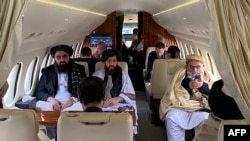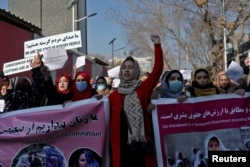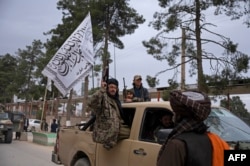Despite establishing near-total control over Afghanistan since regaining power six months ago, the Taliban have been struggling to secure international legitimacy for their government amid a growing humanitarian and economic crisis.
The Islamist group seized the Afghan capital, Kabul, on August 15 as the Western-backed government collapsed and the United States along with allied troops withdrew from the country.
But concerns over human rights, particularly those of women, the Taliban's ties to terrorism and a lack of inclusivity in the new administration in Kabul, have discouraged the global community from recognizing the Taliban as legitimate rulers.
The Taliban have cracked down on dissent, and blocked most women from the workplace and most girls from attending secondary school since returning to power. The group, which subscribes to a strict interpretation of Islam, revived many of the restrictions it had imposed during its previous rule in Afghanistan from 1996 to 2001.
Female activists have been detained and released in recent weeks for protesting a rollback of their rights while journalists routinely complain of curtailed press freedoms and violence by Taliban authorities.
Taliban forces have also allegedly carried out reprisals against former officials of the now-defunct Western-backed government despite announcing blanket amnesty for all Afghans after seizing power on August 15.
Government officials in Kabul reject allegations of reprisals and repression, insisting they respect the rights of all Afghans, including women's rights to education within the boundaries of "Islamic laws" and Afghan culture. At the same time, Taliban authorities have defended arresting those "who violate the law."
Suhail Shaheen, the Taliban permanent representative-designate to the United Nations, told VOA his government has met all conditions required for it to be given international recognition.
"We rule all of Afghanistan and we are in control of its frontiers. We enjoy support of the [Afghan] public and, based on these conditions, our government must be formally recognized," Shaheen said.
The United States and even Islamic countries, including Afghanistan's immediate neighbors such as Pakistan, contend, however, that the Taliban need to do more before seeking legitimacy for their rule.
"I find so far an encouraging degree of [international] unity when it comes to holding on recognition for more meaningful steps toward respect for the rights of all Afghans, for a move toward a more representative government, toward responsible stewardship of the economy," said Tom West, the U.S. special envoy for Afghanistan, while speaking at a seminar Tuesday in Washington.
West noted that in his dialogue with Taliban representatives he found them "very sincere in their intent to contain" Islamic State terrorists in the country. But he sounded skeptical about the Taliban's efforts to contain al-Qaida, saying the U.S. would "want to have greater confidence in the steps" being taken against that terror network.
The U.S. envoy said he has also raised concerns about reprisal killings and the disappearance of critics of the Taliban, saying such incidents "are under-reported" and those responsible have yet to be held accountable.
Independent observers also are skeptical about the Taliban's claims to have met all requirements for them to be declared the legitimate rulers of the country.
Torek Farhadi, a former Afghan government official and analyst, said the fundamentalist group's insistence that "we go by our customs regarding the women" is not acceptable to other countries and that no foreign government would risk its reputation by launching formal diplomatic ties with Kabul for now.
"For many countries, recognizing [the] Taliban while they offer little clarity on universally accepted rights of women to work and education has been the real turnoff," Farhadi said.
"The Taliban have to understand they have to change and the world is not interested in lowering universal standards for them," he said. "We hope they do change," he added, because the consequence of Afghanistan not having a recognized government "punishes the entire population of the country."
China, Russia and Islamic countries, including Pakistan, all maintained close contacts with the Taliban even before they seized power, and intensified direct engagement with Kabul in recent weeks to help them deal with the nation's humanitarian and economic crises. However, they have also ignored the Taliban's calls for formal recognition, citing concerns over human rights and terrorism.
"No country wants to be the first to recognize the Taliban, which has long been viewed as a pariah," said Michael Kugelman of the Washington-based Wilson Center.
"Many countries think it's wrong to recognize a regime with ties to international terrorist groups and retrograde views about women, and that seized power without a power-sharing deal," he said.
Kugelman said the lack of recognition complicates global efforts to ease Afghanistan's catastrophic humanitarian crisis because international assistance cannot be sent to Afghanistan through the Taliban under current circumstances.
"There's a very compelling case to be made for not recognizing the Taliban regime, but this throws up some major barriers to providing the international economic relief that Afghanistan badly needs. And it's the Afghan people, not the Taliban regime, that suffer the most," Kugelman lamented.
West said the U.S. is working with other international partners and stakeholders to help address worsening humanitarian and economic conditions. He said such efforts are likely to continue even if the Taliban fail to make good on pledges regarding the treatment of women and other rights issues.
Taliban officials have allowed women to resume their work in the health sector, opened private and public universities to female education while secondary school girls are also back in about a dozen of the 34 Afghan provinces. They have pledged to allow all girls to return to school next month, blaming delays on financial constraints and the time it takes to ensure that girls resume classes in accordance with Islamic Sharia law.
Regional diplomatic sources say that although the Taliban have brought a degree of stability to Afghanistan, it is too early to know whether it will last, noting that armed opposition groups led by minority Tajik leaders have vowed to resist the Islamist rulers. Taliban rule could be put to the test in coming months when the traditional summer fighting season begins in the country.







